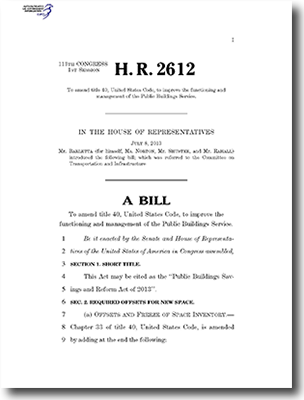 On July 10th, the House Transportation and Infrastructure Committee gave unanimous, bi-partisan approval to move the Public Buildings Savings and Reform Act of 2013 (PBSRA) on from the committee to the House floor. Writing this legislation must have been cathartic for the long-time Representatives who sponsored it because it appears to catalog every grievance the House has had with GSA over the past decade. The list is long–so long that we will not detail every item here. These are the highlights:
On July 10th, the House Transportation and Infrastructure Committee gave unanimous, bi-partisan approval to move the Public Buildings Savings and Reform Act of 2013 (PBSRA) on from the committee to the House floor. Writing this legislation must have been cathartic for the long-time Representatives who sponsored it because it appears to catalog every grievance the House has had with GSA over the past decade. The list is long–so long that we will not detail every item here. These are the highlights:
Freezing the inventory: OMB has already established a “freeze the footprint” policy but this Act seeks to codify it. Mirroring OMB policy, the PBSRA asserts that the GSA may not increase its real property inventory and, specifically, that any prospectus proposing new space must also contain information outlining the details of the elimination of at least a corresponding amount of space elsewhere. Though OMB has already issued this policy, Congress wants to participate in the oversight.
Maximum rental rates: The PBSRA directs GSA to establish maximum rents for each region of the U.S. This practice already exists (generally) for prospectus-level leases but the twist here is that Congress wants to extend the concept of rent caps to all leases, regardless of size. If GSA finds that it must exceed this rent cap, it must first notify Congress. Additionally, Congress requires notification of GSA’s intent to enter into any lease-construct (i.e. build-to-suit) project, regardless of size or rent.
Courtroom sharing: For years Congress has railed against the proliferation of “extravagant” courthouses across the nation and it has pressured GSA and the judiciary to institute courtroom sharing (the practice of multiple judges and magistrates using the same courtroom–at different times, of course) to improve space utilization. With the PBSRA, the House seeks to moderate courthouse construction by implementing the simple but strict requirement that no courthouse may be built unless it implements courtroom sharing.
Bonuses, Conferences and Travel: Ever since the Vegas conference scandal broke last year, Congress has been relentless in its oversight of GSA’s spending. I am of the mind that the rigid conference and travel restrictions imposed on GSA will ultimately hurt the agency’s effectiveness, yet new (and occasionally comical) mini scandals keep popping up, fueling congressional animus. Transportation and Infrastucture Committee Chairman Rep. Bill Shuster (R-PA) tweeted after his committee approved the PBSRA legislation: “For too long taxpayers have watched the GSA take their hard earned dollars and spend it on ridiculous conferences, bonuses, and travel.”
Limitation on agencies’ leasing authority: In reaction to SEC’s ill-conceived Constitution Center lease and, more recently, to the Nuclear Regulatory Commission (NRC) lease of Three White Flint (a new building providing twice the space now needed by NRC), Congress has sought to consolidate all leasing under GSA. I’ve always felt that this is ironic, given Congress’ thorny relationship with GSA but I assume that the legislative branch figures it’s easiest to keep its thumb on just one executive agency and not many. It’s a shame, however, for many independent agencies that have effectively managed their own leasing for years. Fortunately, the PBSRA contains some vague language allowing GSA to delegate leasing authority to agencies that prove themselves capable of this responsibility. We suspect, however, that those delegations will be rare.
In addition to the issues outlined above, the PBSRA requires lots and lots of reporting. Many a tree will meet it’s ultimate fate. GSA must regularly report information on: the leases it executes each year; opportunities to consolidate or co-locate space; its internship and graduate programs; conference expenditures, attendance and agendas; administrative budget expenses, including salaries and bonuses, staffing and travel; building operations and maintenances costs; utilization rates for space in owned and leased buildings; plans for real property cost savings; project cost escalations or reductions, and; how its acquisition activities conserve costs and resources, encourage growth and redevelopment, and improve the “social, economic, environmental and cultural conditions of…communities.”
The overarching theme of the PBSRA legislation is simple: more oversight is required to reign in costs at GSA and protect the taxpayer dollar. On its face, that is noble. However, we know too well that this oversight will force GSA further into a defensive posture–one where the focus will be on “Process” at the expense of “Progress” (getting transactions completed in an efficient and timely manner). Lessors have reason to be concerned about this legislation.
